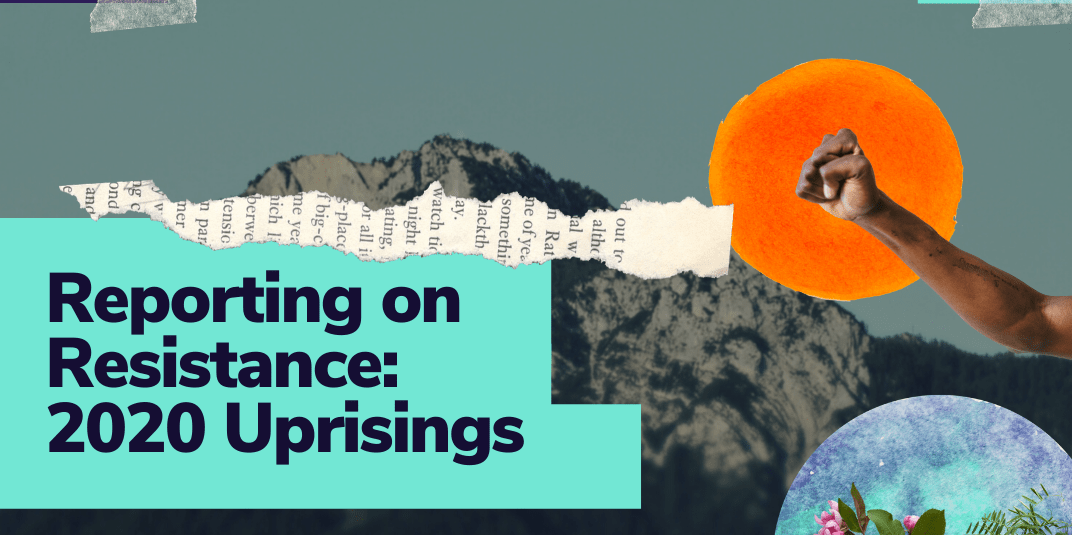Reframing Resistance Coverage Can Build Trust in Local News

In June, Coloradans joined the global outcry over the killings of George Floyd, Ahmaud Arbery, Breonna Taylor, Tony McDade and our own Elijah McClain.
This multi-ethnic and multigenerational movement mobilized to demand accountability for the harms of policing, hoping to bridge the long-standing racial divide between justice and law enforcement that’s necessary for community healing.
The racial reckoning, as the media call it, isn’t new. Black communities have been reckoning with state-sanctioned violence for generations. What’s made this time different is a global pandemic serving as backdrop, making these uprisings all the more real and potentially risky to everyone on the ground — including the journalists reporting in real time.
Reporting on the uprisings has also led to a reckoning within newsrooms. At outlets across the nation, journalists of color have called out the lack of internal diversity and the racial discrimination they’ve faced over the course of their careers. Both of these forces have too often led to biased reporting about Black, Indigenous and people of color (BIPOC) communities.
In Colorado, journalists who attended the Colorado Media Project’s Real Talk conversations acknowledged a lack of meaningful connection to BIPOC communities and expressed an urgent need to build trust and undo harm by telling these communities’ stories.
Toward coverage that honors Black life
Through News Voices: Colorado, which launched in August, Free Press and Colorado Media Project are seeking to bridge those connections. We’re listening to residents around the state to understand their questions about how local news is covering the protests and how that coverage is specifically impacting Black residents.
In September, we co-hosted a virtual event with the theme “Reporting on Resistance: 2020 Uprisings”. Students, organizers, elders, government leaders and others discussed how they view local coverage of the uprisings and explored the impact of that reporting on their communities. Alongside local journalists, we brainstormed about what local reporting might look like with community at the center of coverage.
At the heart of the conversation was a discussion of the role journalism can play in creating systems that honor Black life. Instead of focusing solely on coverage of the protests, those who participated in the conversation were eager to discuss the underlying conditions behind the protests. We discussed how local news can help inform what actions people take to support racial-justice movements and Black communities as a whole.
“I think a lot about what is news and who defines it,” said journalist Lucy Haggard. “Maybe the reason why young people don’t read the mainstream news is because it doesn’t seem to reflect them; they don’t feel seen.”
In small groups, members surfaced many of their concerns with current and historical coverage of Black communities. Sandra Marsh, a Black resident who has lived in Colorado for 50 years, expressed a desire for journalists to have a more comprehensive understanding of the history of anti-Black oppression in the United States.
“We’ve had a lot of things that have happened to us, through our great-grandparents and grandparents,” she said. “Things that need to be reported on and written in history. And we need to share that.” Sandra discussed how journalists who invest in building long-term relationships with Black communities in Denver could be better positioned to cover that complexity.
Participants discussed other areas of opportunity for local news and journalism to repair harm, such as:
- refusing to use anti-Black language when covering protests
- white journalists self-educating about Black history and culture to shift the emotional and mental labor away from Black journalists and non-journalists
- critically analyzing media’s use of “authoritative” sources, such as the police, and considering how overreliance on such sources skews narratives on crime and promotes racist stereotypes
Community members inside and outside of newsrooms addressed and named the practices that have led to historical mistrust between Black communities and local journalism. In naming those harms, we were also able to identify areas for growth, and opportunities for collaboration.
One participant mentioned that training young organizers about media and local news could help strengthen the agency they have in shaping narratives around protests.
Other small groups surfaced ideas such as creating style guides for newsrooms to follow when covering protests and encouraging journalists to engage with community members as a habitual practice — rather than reaching out only when they need a source. Participants also discussed the need for journalists to intentionally cultivate relationships with Black voices rather than incorporating them only to fill quotas or reinforce anti-Black stereotypes.
This meeting was the first of many steps for News Voices: Colorado and Colorado Media Project to work with Coloradans to create practices and systems that lead to local reporting that reflects the full humanity of the communities that local newsrooms are meant to serve.
During our conversation, both non-journalists and journalists alike expressed a shared desire for building trusting and meaningful relationships that center community members’ experiences, expand sourcing beyond the transactional, and give people solution-based local news that deepens civic engagement. The conversation closed one step closer toward a new future where Colorado local news honors, uplifts and creates practices and institutions that affirm Black life and dignity.
Are you a Colorado journalist or community member who would like to join us on this journey? Sign up here.
Diamond Hardiman is the News Voices: Colorado manager at Free Press and Philip Clapham is a project manager at the Colorado Media Project.